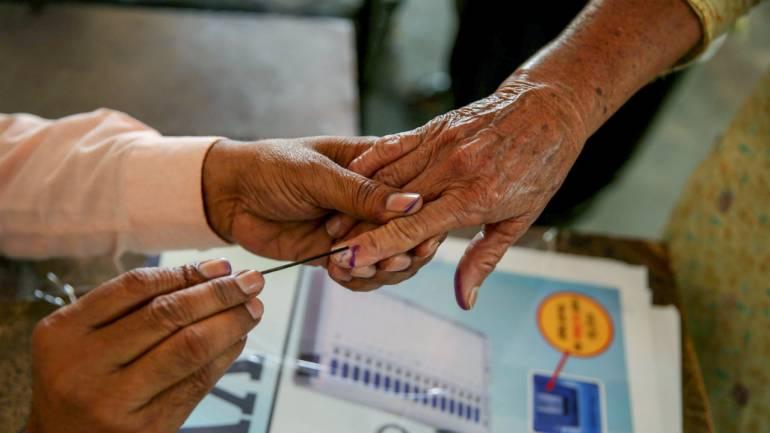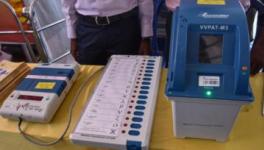Delhi Elections: Major Parties Keep Mum on Scourge of Contract Work

Representational Image. Image Courtesy: Money Control
Let’s have no doubt about the fact that Bharatiya Janata Party (BJP) wants all the workers to become contract labourers. Workers who are more pliable and meek and are at the mercy of their employers. In short, workers who are essentially modern slaves.
This has been achieved by the Narendra Modi-led NDA government at the Centre mainly through modifications in the relation between the employers and employees in the country over the years, under its tenure. Fixed term employment was introduced in October 2016, first only for the apparel manufacturing sector, which was later extended to all sectors in 2018. And finally, in a bid to provide it a legislative backing, Industrial Relations Code, 2019 was introduced in Parliament last year in November, then referred to a standing parliamentary committee.
The opposition to the rising contractualisation of the workforce has come unanimously from the central trade unions and workers’ organisations. Politically, the main opposition alliance at the Centre, UPA, led by Congress, was expected to challenge this in Parliament. However, it kept mum as the ripe conditions for rising contractualisation were only the continuation of the events that unfolded after 1991—with the opening up of the Indian economy.
When it comes to labour, despite it being in the concurrent list of the Constitution, the contractualisation process remained mostly unchallenged by any of the state governments. However, this changed with the Arvind Kejriwal–led Aam Aadmi Party (AAP) coming to power in the national capital, first for a brief period in 2014 and then again—in a defining victory—in 2015.
The party imaged itself as a new bandwidth of alternative politics. Among others, it also promised to put an end to contractualisation and regularisation of all the non-perennial job.
Five years down the line, as the national capital goes to polls on February 8, NewsClick takes a look at various departments under the Delhi government to assess if the AAP government stood by its words.
Delhi Jal Board
Constituted in 1998, Delhi Jal Board (DJB) meets the needs of potable water in the National Capital Territory of Delhi. The board that used to have 100% workforce, employed on permanent terms, is now gripped under the clutches of rampant contractualisation.
“There has been no recruitment in the Jal Board for the last several years,” said Ashok, general secretary of Delhi Jal Board Employees’ Union. “While a large number of employees have retired over the years, all new employees who came in their place were either on contractual terms or outsourced.”
Ashok further informed NewsClick that the last major recruitment drive in the department only took place in 1989, before the formation of the board, when water distribution was under the jurisdiction of Municipal Corporation.
With no social or economic security at hand, majority of the Jal Board workforce fails even to receive minimum wages, according to Ashok. “A contract employee only makes up to Rs 10,000 for a job which fetches a regular employee Rs 30,000-40,000,” he added.
Incidentally, the chairperson of the DJB is CM Arvind Kejriwal himself. Labourers within the same department have reportedly died while cleaning sewers. However, the CM has not done anything substantial to better this situation.
Also read: Delhi Elections: BJP’s Last Throw of Dice
Centralised Accident and Trauma Services (CATS)
An autonomous body of Government of National Capital Territory of Delhi (GNCTD), CATS provides free pre-hospital ambulance services to victims of accidents and trauma round the clock.
Outsourcing its operations in 2016, the Delhi government roped in a private agency to carry out the functioning. And the contractual workers who were hoping to get regularised as government employees, got absorbed by the new private owner.
Delays in payment of salaries and exploitation at work soon followed this development, adding to the woes of the already vulnerable workforce. The fallout of this could be seen in the periodic protests by the workers expressing their discontent with the Kejriwal government.
Privatisation of the ambulance services hasn’t fared well for many employees of the body and the patients, as the work environment completely changed for the worse, explained Narendra Singh Lakra, president of the CATS Contractual Employees’ Association.
Delhi Transport Corporation (DTC)
Out of all the achievements that are being listed by the AAP government in its performance report card for the last five years, one is the free ride scheme for women in the public buses in the national capital.
However, some disturbing yet little known facts about the workers of DTC—the main public transporter in the city—reveals the double standards of the Kejriwal government. As many as half of the workforce is on contractual terms. The salaries of the workers are not regular, but on ‘per kilometre’ basis which translates to much lower payments. And most importantly, the case is no different for women workers.
The Kejriwal government has been accused of killing the public transport system by the DTC workers’ front in the past.
This was achieved, even by previous governments in power, by giving a “special treatment” to Delhi Integrated Multi Modal System (DIMTS)—a joint venture in which the GNCTD holds 49.99% share, eventually making it a private company—in awarding works and additional buses. Kejriwal, according to the DTC employees’ representatives, followed the suit.
All Parties Join Hands, No One Spoke
Moreover, the working conditions in the departments under Delhi’s municipal corporation—ruled by BJP since after the 2017 polls—deteriorated.
No matter which political party wins what elections, contractualisation of the labour has increased, in a rampant fashion, in government hospitals, namely, Hindu Rao Hospital (under the BJP’s municipal corporation), Guru Teg Bahadur Hospital (under Delhi’s state government) or even in Dr. Ram Manohar Lohia Hospital (under the central government); in education sector, where teachers and professors at all levels are protesting against the low pay scales and vulnerable working conditions; and other departments as well.
As a result, in the recently concluded campaigns surrounding the 2020 Assembly elections, the issue of contractualisation has failed to find any space. In a triangular contest for 70 Assembly seats, the incumbent AAP, for not fulfilling its promise, was not targeted by the opposition. As expected, all three are partners in this crime!
Also read: Delhi Elections: How Politics Weighs Over Processes in Regularisation of Unauthorised Colonies
Get the latest reports & analysis with people's perspective on Protests, movements & deep analytical videos, discussions of the current affairs in your Telegram app. Subscribe to NewsClick's Telegram channel & get Real-Time updates on stories, as they get published on our website.
























